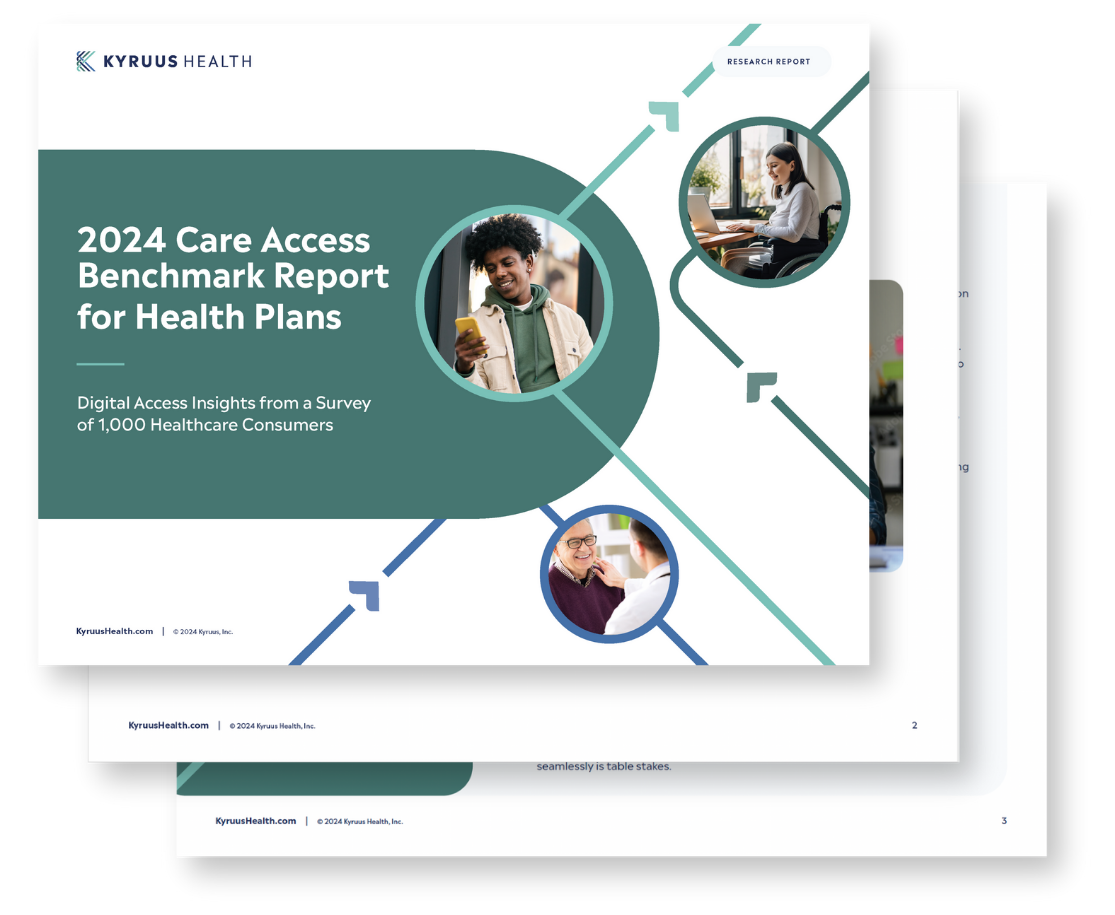The 2024 AHIP Conference brought together health insurance thought leaders from across the nation. Discussions at AHIP ranged from the latest trends and challenges to innovations impacting healthcare. Covering a wide array of themes, the sessions offered insights into topics including data management, regulatory compliance, member engagement, care management, and the latest in artificial intelligence (AI). The Kyruus Health team enjoyed attending various insightful sessions and hosting an event to connect with industry peers.
The Kyruus Health team hosted an event following the first day of sessions.
Five Key Takeaways from the 2024 AHIP Conference in Las Vegas
1. Embracing Regulatory Changes as Opportunities for Innovation
One of the major themes of the conference was the evolving regulatory landscape and how organizations can adapt to it. In the session Regulatory Upheaval: Managing the Pace of Change, a panel of experts from L.A. Care Health Plan and Deloitte & Touche LLP emphasized the importance of integrating compliance into strategic planning.
They highlighted that regulatory requirements should not be seen merely as checklists but as opportunities for organizational growth and innovation. Leveraging adaptable and scalable technology, while ensuring a strong foundation in data governance, was also stressed. The panel also noted the potential benefits of viewing compliance through a positive lens, sharing that regulatory requirements can support business strategies of delivering value.
These themes align closely with insights from Kyruus Health’s 2024 Benchmark Report for Health Plans, which found that despite greater access to transparency tools following Transparency-in-Coverage mandates, both awareness and utilization of those tools have decreased. Health plans must go beyond checking the compliance box to ensure their digital tools are in fact enhancing the member experience.
2. Prioritizing Mental Health and Health Equity in Employee Benefits
Speakers from Providence Health Plan, Voya Financial, Mercer, and Salt & Straw Ice Cream discuss key trends, challenges, and innovations in employee health benefits.
The importance of mental health and health equity emerged as crucial topics throughout the conference, including in the session Industry Trends and Insights: The Employee Health Benefits That Matter Most. The panel, including speakers from Providence Health Plan, Voya Financial, Mercer, and Salt & Straw Ice Cream, discussed key trends, challenges, and innovations in employee health benefits.The focus was on understanding the evolving needs of employees, especially in the context of mental health and health equity, and how employers can adapt to provide better, more inclusive benefits.
The speakers discussed the growing demand for mental health services among employees and the necessity for employers to offer comprehensive mental health coverage, including virtual care options. Addressing health equity by ensuring benefits cater to the diverse needs of the workforce through data-driven interventions was highlighted as well. “Employees are more likely to stay with an employer if they feel like the mental health resources offered are robust,” stated Carole Mendoza, Vice President of Benefits at Voya Financial, pointing to the direct link between employee well-being and retention.
To explore more ways to engage employer groups and their employee members, watch a recording of the webinar Mastering Digital Transformation: Strategies to Optimize Digital Tools for Employer Groups.
3. Enhancing Member Engagement and Retention
Another area that was explored extensively throughout the conference was strategies for member engagement and retention, including in the session Reimagining Touch Points for Engagement and Retention. Speakers from GuideWell, CDPHP, and Chief Customer shared insights on integrating consumer feedback from various touchpoints such as community interactions, provider feedback, and social media. Camille Harrison, Chief Innovation and Experience Officer at Guidewell, emphasized this point by stating, “Every time that we have an opportunity to hear feedback, we’re collecting that and we’re also looking at how our vendors interact with our customers.”
They emphasized the importance of using technology and data analytics to anticipate member needs and create personalized experiences, aligning with recent findings that members want more personalized cost estimates to help them make informed care decisions, but only 32 percent strongly agree that their health plan can provide accurate information about expected costs. Proactive problem-solving and maintaining trust through transparent communication were also key points discussed.
“Every time that we have an opportunity to hear feedback, we’re collecting that and we’re also looking at how our vendors interact with our customers.” – Camille Harrison, Chief Innovation and Experience Officer at Guidewell
4. Understanding and Incorporating Patient Preferences
Speakers from Patient Advocate Foundation and UCare discuss the importance of understanding patient preferences to improve healthcare delivery.
Members, especially younger generations, wish their health plan provided more detailed provider profiles, including photos, videos, and care philosophy. This theme was highlighted in the session Patient Preferences When Selecting Providers to Inform Networks and Directories, which underscored the importance of understanding patient preferences to improve healthcare delivery. Kathleen Gallagher of Patient Advocate Foundation and Pleasant Radford, Jr. of UCare discussed how patient preferences for providers who share their background can inform network directories and enhance provider training.
They emphasized the need for healthcare providers to be trained in cultural competency and empathy to ensure better patient experiences. Kathleen Gallagher pointed out, “Addressing factors that influence patient care perspectives and experience is necessary to ensure an equitable healthcare experience,” stressing the significance of aligning healthcare services with patient expectations.
The speakers also shared that experience and sensitivity are top of the list when members search for care, and that they prefer to go online to a health insurance provider directory to be able to see those pieces of information. By partnering with Kyruus Health, Pleasant Radford shared that their members will soon be able to see “race, ethnicity, preferred languages, cultural competencies, the types of courses that they’re taking and how they’re moving the needle of their cultural competence.”
5. Advancing Value-Based Specialty Care
The integration of value-based care (VBC) into specialty care was a critical topic at the conference. In the session Driving Progress in Value-Based Specialty Care, speakers from Independence Blue Cross, Capital Blue Cross, and Thyme Care discussed the necessity of shared accountability and provider engagement to control healthcare costs and improve patient outcomes.
They highlighted the unique challenges and opportunities in designing specialty value-based models, emphasizing the need for shared accountability, provider engagement, and alignment across payers. The role of technology and data analytics in facilitating VBC by enabling better tracking and management of patient care was also emphasized.
The 2024 AHIP Conference provided invaluable insights into the future of healthcare, emphasizing the need for innovation, inclusivity, and strategic adaptation. From regulatory changes to employee benefits, customer engagement, patient preferences, and value-based care, the sessions underscored the industry’s commitment to improving healthcare outcomes through collaboration, technology, and a member-centric approach. As the healthcare landscape continues to evolve, the lessons and strategies discussed at the conference will undoubtedly play a pivotal role in shaping a more efficient, equitable, and innovative healthcare system.
For more care access insights and actionable steps to advance member engagement and experience, download the 2024 Care Access Benchmark for Health Plans.





